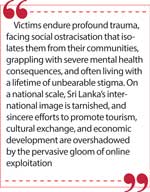Friday Feb 20, 2026
Friday Feb 20, 2026
Wednesday, 17 September 2025 00:26 - - {{hitsCtrl.values.hits}}

Beneath its gleaming surface, a dark current runs, pulling vulnerable souls into an unseen depth
 Imagine the smooth, low voice, almost a vibration, dripping with false admiration painting a glittering hallucination against the backdrop of a girl’s whispered dreams: “Look at you. You have a light, a spark that most people only dream of. A truly unique look. You weren’t meant for this small life, this struggle. I see a star in you, darling, shining so bright, just waiting for the right lens to capture it. This isn’t just a photoshoot; this is your highway to stardom. A direct path. We work with the biggest names, the global platforms. Your face, your beauty – imagine it known everywhere. No more worries, no more hardship. Just a few simple poses, nothing complicated, perfectly professional, completely safe. We handle everything, every detail, your privacy is absolutely guaranteed. This isn’t for just anyone, you understand? This is an exclusive opportunity, for truly special talent. Think of the life you could have, the doors that will open. This is your moment. Are you ready to truly twinkle?” voice of a Serpent.
Imagine the smooth, low voice, almost a vibration, dripping with false admiration painting a glittering hallucination against the backdrop of a girl’s whispered dreams: “Look at you. You have a light, a spark that most people only dream of. A truly unique look. You weren’t meant for this small life, this struggle. I see a star in you, darling, shining so bright, just waiting for the right lens to capture it. This isn’t just a photoshoot; this is your highway to stardom. A direct path. We work with the biggest names, the global platforms. Your face, your beauty – imagine it known everywhere. No more worries, no more hardship. Just a few simple poses, nothing complicated, perfectly professional, completely safe. We handle everything, every detail, your privacy is absolutely guaranteed. This isn’t for just anyone, you understand? This is an exclusive opportunity, for truly special talent. Think of the life you could have, the doors that will open. This is your moment. Are you ready to truly twinkle?” voice of a Serpent.
The vast, shimmering web of the internet promised connection, knowledge, and boundless opportunity. Yet, beneath its gleaming surface, a dark current runs, pulling vulnerable souls into an unseen depth. In Sri Lanka, this digital darkness has cast a particularly cruel shadow, revealing a harrowing truth: the faces of beloved school girls, the respected images of teachers – ordinary people from bustling cities and quiet villages – are being paraded across the world’s most sleazy online platforms. This isn’t just an off-colour statistic; it’s a profound human tragedy unfolding silently, stealing dignity, shattering lives, and laying bare the rawest vulnerabilities within families and communities across the island and the globe.
Cuts deeper than any knife-edge
The very language used to market this exploited content cuts deeper than any knife-edge. Imagine the shock, the cold trepidation, of seeing a loved one reduced to an outlandish headline: “Sri Lankan spa girl kinky,” “hot Sri Lankan Tamil girl,” “Sri Lankan outdoor hot sex,” or even “Sri Lankan granny.” These aren’t descriptions; they are brutal labels, crafted with chilling fastidiousness to strip away identity and reduce a human being to a crude, glamorised illusion. “Spa girl” whispers of promises twisted into exploitation; “granny” hints at a demand for particular age-play roles that sadistically disregards wisdom and life lived, replacing it with a warped incarnation. Each word is a baton-blow, stripping away agency, dignity, and personal story, transforming individuals into mere commodities for the darkest desires, feeding specific sexual fixation categories demanded by ghostly consumers.
But the true terror lies in the headlines that touch the innocent: “Sri Lankan school girl desire” or “Sri Lankan Red Riding Hood.” These aren’t metaphors; they are direct, hair-raising invitations to child sexual abuse material, a crime so heinous it leaves indelible scars on the soul of a child and stains the conscience of humanity. The twisted use of innocent fairytale imagery, like “Red Riding Hood,” to cloak such vile content is a testament to the predacious minds at work, actively seeking to exploit the very essence of childhood purity. The mere existence of such search terms screams of a terrifying reality where innocence is not just lost, but brutally stolen and commodified, fuelling a horrifying segment of illicit content streams, leaving behind a wake of unimaginable devastation for its young victims.
Intimate betrayal through local terms
 Even more tear-jerking is the intimate betrayal whispered through local terms. “Battaramulla spa” conjures images of specific places, suggesting illicit activities festering within familiar establishments. And then there’s “Allapu Gedera Akka” – the Sinhala phrase for “the elder sister from the next house” or “the girl from next door.” This term adds a chilling, unbearable layer of familiarity, hinting at private moments, often consensual, tragically betrayed and broadcast without permission. It speaks of revenge porn, of trust shattered by former partners, and of exploitation stemming from within communities, eroding the very fabric of trust and leaving profound shame in its wake.
Even more tear-jerking is the intimate betrayal whispered through local terms. “Battaramulla spa” conjures images of specific places, suggesting illicit activities festering within familiar establishments. And then there’s “Allapu Gedera Akka” – the Sinhala phrase for “the elder sister from the next house” or “the girl from next door.” This term adds a chilling, unbearable layer of familiarity, hinting at private moments, often consensual, tragically betrayed and broadcast without permission. It speaks of revenge porn, of trust shattered by former partners, and of exploitation stemming from within communities, eroding the very fabric of trust and leaving profound shame in its wake.
When a voice is added – “Sri Lankan sex with voice” – the perverse illusion of intimacy is heightened, no matter how the content was obtained or how cruelly consent was disregarded. Even seemingly harmless phrases, like “Sri Lankan Robin Hood,” can be coded signals within hidden online communities, pointing to those who facilitate this dark trade, using hidden webcams to capture and exploit, highlighting the insidious layers of this hidden digital flora and fauna.
While we may not have precise numbers, the sheer volume and variety of these headlines paint a distressing picture of hardcore vulnerabilities. For many, caught in the grip of dire economic hardship, the desperate promise of even a small sum of money can become a powerful, ultimately destructive lure. Others, particularly from communities with limited access to technology, simply don’t grasp the internet’s permanence, unaware that a private moment shared can become a global spectacle, with devastating consequences. All too often, organised crime and human trafficking networks lurk behind the screens, preying on the most vulnerable.
Girls, dreaming of a brighter future, are tragically enticed by so-called photographers and videographers masquerading as legitimate professionals. These predators promise a dazzling path to stardom, engaging in insidious talent recruitment, luring them into cheap hotels in the suburbs, where velvety background set-ups belie the sinister intent. There, images and videos are captured, only to be cruelly exposed to worldwide pornographic sites, their dreams twisted into a nightmare. This insidious method, alongside other forms of coercion, weaves webs of exploitation across borders.
Chilling truth
And when private, intimate moments are leaked without consent, often by vengeful former partners, the trauma of “revenge porn” leaves victims with deep, lasting wounds. Ultimately, all these threads lead back to one chilling truth: a significant, unyielding global demand for illicit content, a demand that directly fuels the exploitation of precious lives in countries like Sri Lanka.
However, available reports from recent years indicate ongoing law enforcement efforts:
2023-2024 Trafficking in Persons (TIP) Report (covers reporting period from April 2022 to March 2023, published mid-2024):
The Criminal Investigation Department’s (CID) anti-trafficking unit and police initiated at least 22 investigations involving 24 suspected traffickers (21 for sex trafficking and 3 for forced labour). This was a decrease from the previous reporting period’s 34 investigations involving 60 suspects.
The Government convicted 13 traffickers, including seven for sex trafficking (under Section 360A of the Penal Code) and six for labour trafficking. This shows an increase in convictions compared to the previous period.
Sri Lankan authorities also cooperated with international partners like INTERPOL, the private sector, and civil society to enhance investigations of crimes involving sexual exploitation of children, including online crimes.
Earlier Reporting (covered by 2023 TIP report, i.e., April 2021 to March 2022):
Police initiated at least 34 investigations involving 60 suspected traffickers (33 for sex trafficking and 27 for forced labour).
The Government convicted four traffickers (two sex traffickers and two labour traffickers).
Specific Child Sexual Exploitation Cases:
A report from March 2025 indicated that the Women & Children’s Bureau, in collaboration with partners like International Justice Mission (IJM) and the National Center for Missing & Exploited Children (NCMEC), opened 157 cases and made 13 arrests related to online child sexual exploitation within an eight-month period (presumably late 2023 to early 2024). This specific data point highlights arrests for online child exploitation.
Combating online exploitation
While a single cumulative figure for arrests specifically for all forms of “online sexual exploitation and trafficking, including enticement” is not readily available, the data from the US State Department’s TIP reports and specific project reports indicate that Sri Lankan authorities consistently initiate dozens of investigations and make a significant number of arrests annually (e.g., 24 suspects investigated for trafficking in the latest TIP report, and 13 arrests in a specific anti-online child sexual exploitation project within eight months), prosecuting individuals for these grave offences, including those involving online enticement. The focus on combating cybercrime and online exploitation has increased, suggesting continued efforts in this area.
The global adult entertainment industry, particularly its origins in places like Los Angeles’s “Porn Valley,” cast a long shadow, building a multi-billion-dollar machine. Even as the digital age decentralised production, the platforms that host this content, some of the largest webcam sites based in Europe and the US, claim to have strict age verification checks. They proclaim adherence to laws prohibiting content involving minors. Yet, the undeniable presence of child sexual abuse material from Sri Lanka on these very platforms stands as a damning indictment. These “safeguards” are often flimsy veils, easily bypassed by exploiters. The sheer volume of content categories and the cunning of predators make robust age verification a constant, losing battle for these platforms. Even if official performers are vetted, user-generated content and privately shared material can bypass every check, leaving a trail of shattered dreams.
Impact nothing short of catastrophic
The impact of this disturbing reality on individuals, families, and the soul of Sri Lanka is nothing short of catastrophic. Victims endure profound trauma, facing social ostracisation that isolates them from their communities, grappling with severe mental health consequences, and often living with a lifetime of unbearable stigma. On a national scale, Sri Lanka’s international image is tarnished, and sincere efforts to promote tourism, cultural exchange, and economic development are overshadowed by the pervasive gloom of online exploitation.
Addressing this multifaceted wound demands a concerted, compassionate, and unwavering effort. It calls for robust legal action, identifying, targeting, and prosecuting the perpetrators who profit from this pain, and diligently removing illicit content from online platforms. In Sri Lanka, the National Child Protection Authority (NCPA) is a key body, and while laws exist against child sexual exploitation, there’s an urgent need for more specific legislation targeting online offenses. Crucially, it necessitates the creation of comprehensive, culturally sensitive victim support services, ensuring survivors receive the psychological, social, and legal aid they desperately need to begin healing.
Organisations like ECPAT Sri Lanka are already working tirelessly on awareness, capacity building, research, and advocacy, providing vital counselling and legal assistance. Furthermore, widespread digital literacy programs are essential, empowering individuals with the knowledge to navigate the online world safely and recognise the sinister warning signs of exploitation.
Ultimately, however, a fundamental shift in our collective human conscience is required—a commitment to recognising and fiercely protecting the congenital dignity and autonomy of every individual, especially the most vulnerable among us. Until the demand for such illicit content is curtailed, until the underlying societal vulnerabilities that drive individuals into these horrific situations are methodically addressed, the disturbing presence of Sri Lankan souls in this digital black-hole will continue to be a sagacious scar on our shared flesh and blood.